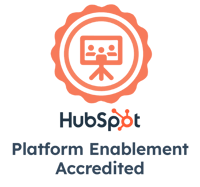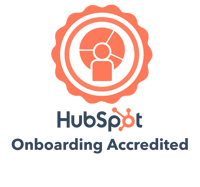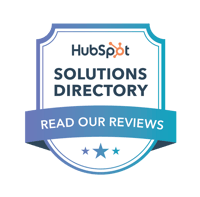The manufacturing industry has long relied on word-of-mouth, trade shows and outbound sales tactics to generate business. However, in this modern digital landscape, these tactics alone aren't enough to generate business.
Buyers are taking control of the sales process. They're doing research online. And they're making decisions about your brand long before ever speaking to a sales rep. This modern market needs modern tactics. That's where inbound marketing comes in.
What is Inbound Marketing?
Inbound marketing is a modern approach to digital marketing. Instead of casting a wide net and trying to chase down customers, inbound marketing focuses on attracting your ideal customers who are most likely to convert into sales. It's an entirely new method and approach to marketing.
The Inbound Methodology
The inbound methodology is based around the concept of a flywheel, including phases that overlap and feed each other. The flywheel serves as the framework of your inbound campaigns. It helps you understand what specific pieces of content and what specific offers will resonate with a buyer based on where they currently sit in the flywheel:

- Attract: Earn your audience's attention, don’t force it. Attract visitors with useful content and eliminate barriers as they try to learn about your company.
- Engage: Open relationships, don’t just close deals. Enable buyers to engage with you on their preferred timeline and channels. Tie sales incentives to customer success, not just close rate.
- Delight: Tie your success to your customers. Shift resources to be more effectively distributed throughout the entire customer experience.
Related Content: How to Get Started with Inbound Marketing
Inbound Marketing Strategies
At each stage of the buyer’s journey, you need to provide value that attracts, engages and delights customers. In a later section of this blog, I'll dig into some specific examples that OEMs and manufacturers can try. To get a feel for what inbound marketing looks like, here are some common types of content that appeal to each stage of the buyer's journey:
Attract Tools
Research or Analyst Reports
Blogs or Editorial Content
eBooks & eGuides
Quizzes
Whitepapers
Templates & Worksheets
Checklists
Engage Tools
Comparison Whitepapers
Expert Guides
Live Interactions
Chatbots
Specific Service Info
Podcasts
Videos
Delight Tools
Vendor Comparisons
Product Comparisons
Surveys
Case Studies
Knowledge Bases
Trial Downloads
Live Demos
5 Key Benefits of Inbound Marketing For Manufacturers
So, inbound marketing is all about your prospects finding you before you find them. But does inbound marketing work for manufacturing companies?
You can probably guess my answer to that is a resounding yes. Inbound marketing is a fantastic fit for manufacturing companies for a few key reasons.
1. Drives Better Quality Leads
Because inbound marketing focuses on attracting prospects who are actively looking for solutions, you have a more qualified audience compared to traditional outbound tactics. Instead of throwing everything at the wall to see what will stick, you're only trying to attract leads who are in your target market and likely to buy.
For Manufacturers and OEMs, this shift to focusing on high-quality leads means that you're spending more time converting high-revenue sales and less time chasing down leads that will never manifest.
2. Establishes Thought Leadership and Brand Awareness
In the manufacturing industry, reputation is everything. Inbound marketing helps your reputational marketing by placing you in your audience's minds as a trusted authority - and not just "someone who is trying to sell me something."
Trust is a vital factor in every purchasing decision, and it's also a delicate thing to build. Establishing yourself as a trusted resource in the industry will help speed up some of that trust-building process with your prospects.
3. Supercharges your SEO
Inbound marketing is intent-based marketing. You're attracting prospects who are actively looking for solutions. The content you produce should align with how Google ranks websites. The big G looks for helpful, useful and relevant content that speaks to a searcher's intent.
Related Content: What is EEAT: The Inbound Marketing Powerhouse You Can't Ignore
4. Shortens the Sales Cycle
Inbound marketing supports complex B2B buying decisions. This is particularly relevant for manufacturing companies where the purchasing decision is often a lengthier and weightier one. Your prospects aren't considering buying a $50 pair of shoes - they're often looking at a $50,000 solution.
The content that helps them make this decision is also much more complex. They're looking for comparison guides, case studies, ROI calculators and other resources that help justify these complex purchasing decisions.
Your inbound marketing campaigns help deliver these resources proactively, which means that your buyers can self-serve their early-stage sales questions. This also means more primed and qualified leads by the time they actively reach out to your organization.
5. It's More Cost-Effective
Inbound marketing can be a much more efficient marketing tactic for manufacturing companies. You're not trying to target every single person in the world - you're looking for that niche buyer that needs your services. Spending tons of money on ineffective ad campaigns to widen your audience pool means that you're also wasting money advertising to people who will never need or want your services.
Additionally, inbound marketing supports complex buying decisions, which leads to improved conversions. In a typical marketing model, you might send contacts a request for quote right away. If they're not ready to take that leap, then they'll bounce away without engaging. Inbound marketing tactics give them alternative resources to engage with before asking them to take that big step. This leads to a much better conversion rate.
Effective Inbound Marketing Tactics for Manufacturers
Now that I've covered the basics of inbound marketing and the benefits it offers for manufacturers, let's talk specifics. How does all of this come together to guide your marketing strategy? OEMs can see the biggest benefit from inbound marketing by being intentional with their tactics. Let's break down some of the tactics that help attract and convert high-quality leads.
Webinars and Sessions
Video content is a highly effective marketing tactic across the board, but for manufacturers and their audiences, it can be even more lucrative. Your audience wants information about complex concepts and industry trends broken down into more digestible bites. Webinars are a great way to break down complex concepts and to open them up to a Q&A. They work well for the attract stage of inbound.
Technical & Educational Content
One of the unique challenges manufacturers face in marketing is that there are often several people involved in the purchasing decision. You're often not only speaking to someone in procurement. You're also being considered by engineers, management, machinists and more. For that reason, you also need content that will attract these other decision-makers at your target organization.
Technical content like spec sheets, research, mock-ups, guides, and more helps attract and engage multiple people at your target organization. Often, an engineer might interact with this type of content while a manager engages with something else. Having content that speaks to both of these audiences helps align them to make that final purchasing decision.
Leverage LinkedIn and Reddit
LinkedIn is an absolutely vital B2B network - but increasingly, we're seeing Reddit rise as another gathering place for a B2B audience. Like with the technical content, this is the place where you're most likely to encounter the engineers, drafters and other team members who are vital in the actual manufacturing process.
You can leverage these social networks to promote your inbound content organically. Share what you've created, but also take the time to engage with the community. Answer questions, post topics of your own and comment respectfully to help increase your brand's presence online.
Use Automation to Nurture Leads
Once you have the contact information from a lead, it's important to help nurture them along their purchasing decision without being overly aggressive and pushy. Instead, you can use automation tools to nurture leads based on what they engage with and what actions they take. As an example - if a lead fills out a form to attend a webinar, you might use automation to send emails or LinkedIn InMail messages to invite them to a future webinar about a similar topic.
Automation is its own beast that I can't fully dig into in this article. If you're looking for effective ways to tap into automation, check out my guide: 5 Examples of Inbound Marketing Automation.
Develop Comparison Guides
Comparison and buying guides are an important tool that buyers use when they're in the decision stage of the buyer's journey. These can be extremely effective for manufacturing companies. One of the easiest ways to develop a manufacturing comparison guide is to look at different processes, materials or technologies to develop the same final piece. This is a highly effective way to provide useful content for your audience.
Develop Case Studies
Case studies are very important for manufacturers and OEMs. In many cases, you're not selling a product as much as you're selling a bespoke solution. Case studies help clients visualize how you problem-solve and create these unique solutions. Even if a prospective client is in a completely different industry than the subject of the case study, they get immense value from seeing your approach and ability to tailor solutions to specific challenges. They can recognize parallels between their own needs and the problems you've solved, building confidence in your capabilities.
The best part of effective case studies is that you don't need to reveal your clients' names if privacy is a concern. You can deliver as powerful a case study through narrative alone, vs. just name-dropping.
Related Content: How to Write a Good Case Study [Free Template]
Inbound marketing is an innovative approach to attracting online leads that can be extremely effective for manufacturers. By developing strategic content and using marketing tactics to serve that content to the right audience, you can improve the quality of your leads, shorten your sales cycle and establish yourself as a trustworthy partner.
Inbound Marketing with BizzyWeb
BizzyWeb is a Minneapolis-based digital and inbound marketing agency that creates powerful inbound campaigns for our clients and provides education so our clients can become powerful inbound marketers themselves. As a HubSpot Partner Agency, we rely on the power of HubSpot’s suite of inbound-ready tools to execute these tactics.
Learn more about our inbound marketing services here.
BizzyWeb is a Minneapolis-based digital marketing and web design agency that helps companies get the high-quality leads they need to grow and thrive. Our tactics include inbound marketing, SEO, advertising, web design, content creation and sales automation. We are an accredited HubSpot Diamond Partner and we offer full-service HubSpot onboarding, enablement and strategy for new and current users.





